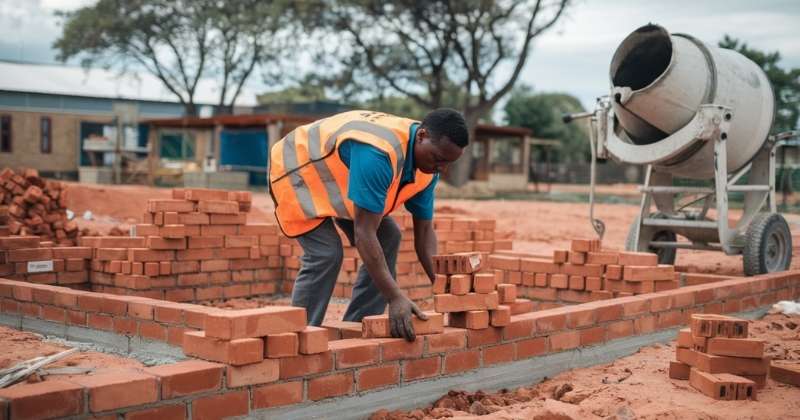
The cost of building a house in South Africa is influenced by various aspects, such as the location of the property, the quality of materials used, the complexity of the architectural design, and the overall size of the structure. Each of these elements significantly affects the total expenses. Assessing building costs also requires attention to regional variations across the country. Urbanisation levels and economic conditions further impact trends within the construction industry.
Key Takeaways
- Construction Costs Vary by Location and Size: The cost of building a house in South Africa is influenced by factors such as location, size, and design complexity. Urban areas tend to be more expensive, while rural areas may offer cost savings. Average building costs range from R10 000 to R20 000 per square metre, depending on the region and quality of materials.
- Planning and Material Choices Impact Costs: Thorough planning and budgeting are critical to managing expenses. Opting for locally sourced materials and cost-effective construction methods, such as timber or steel frames, can significantly reduce overall costs without compromising quality.
- Accurate Quotes and Reputable Contractors Are Essential: Obtaining multiple quotes and evaluating contractors’ reputations and past work ensures reliable estimates and quality outcomes. Choosing experienced contractors may involve higher initial costs but helps prevent issues that could lead to expensive repairs.
About Arcadia Finance
Get your loan hassle-free with Arcadia Finance. Choose from 19 accredited lenders, all adhering to South Africa’s National Credit Regulator guidelines. Enjoy no application fees and a seamless process designed to meet your financial needs.
The Cost of Acquiring Land
Before construction can begin, purchasing suitable land is a key first step. The cost of land varies widely depending on location, accessibility, and zoning regulations. Urban areas typically have higher land prices due to demand and infrastructure, while rural areas may be more affordable. However, buyers should consider additional expenses such as:
- Zoning and land-use regulations – Each municipality has specific zoning laws dictating what can be built on a property. Obtaining the necessary approvals and ensuring compliance can add to costs.
- Surveying and legal fees – Land surveys, title deeds, and legal paperwork are necessary to finalise the purchase, which incurs extra costs.
- Servicing the land – Some plots may require connections to electricity, water, sewage, and roads before construction begins, significantly increasing the overall budget.
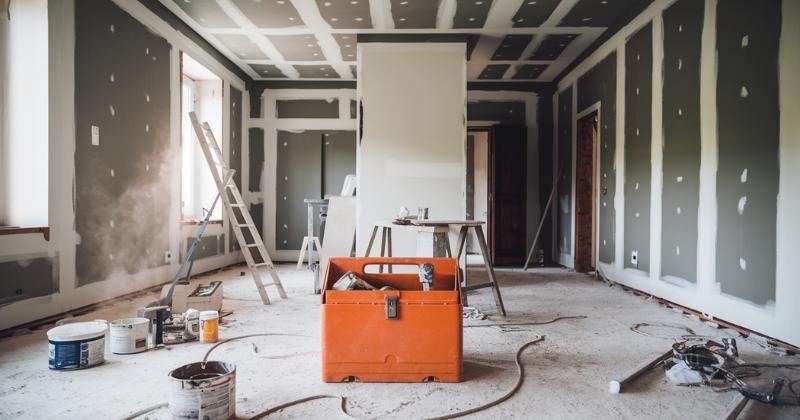
How Much Does It Cost To Build A House?
Building a house in South Africa in 2025 involves several key cost factors, including location, size, design complexity, and material quality. Here’s an updated overview to help you estimate potential expenses:
Average Construction Costs per Square Meter:
- Economic Homes: Starting at approximately R6 500 per square meter.
- Standard Homes: R8 000 to R15 000 per square meter.
- Luxury Homes: Upwards of R20 000 per square meter.
Provincial Cost Variations
Construction costs vary across provinces due to differences in labour, materials, and local economic conditions. Below is a table summarizing the estimated costs per square meter and total costs for a standard 150m² house in each province:
| Province | Cost per m² (R) | Total Cost for 150m² House (R) |
|---|---|---|
| KwaZulu-Natal | 16 700 | 2 505 000 |
| Gauteng | 15 000 | 2 250 000 |
| Western Cape | 14 800 | 2 220 000 |
| Free State | 12 700 | 1 905 000 |
| Eastern Cape | 12 300 | 1 845 000 |
| Northern Cape | 11 800 | 1 770 000 |
| Mpumalanga | 10 400 | 1 560 000 |
| Limpopo | 9 600 | 1 440 000 |
| North West | 9 100 | 1 365 000 |
For more precise figures, you can consult municipalities, property developers, contractors, or quantity surveyors, who may provide tailored estimates based on the specific location and project requirements.
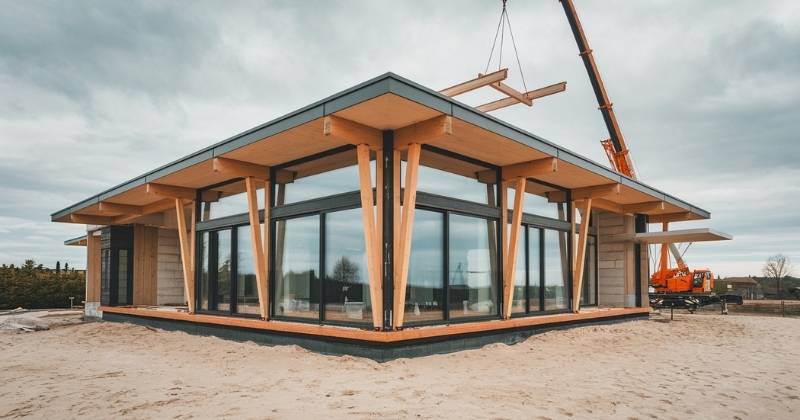
Additional Costs to Consider When Building a House
When planning to build a house, there are several factors to consider that significantly influence the overall cost. These include the location of the property, the quality of materials and design, and the size of the structure.
The Factors That Affect the Cost
The cost of building a house is largely determined by its location. Constructing a home in a well-developed urban area typically incurs higher costs than building in a remote or rural location. This is not solely due to property value but also to specific requirements influenced by the surroundings. For example, houses near coastal areas often require specialised materials, such as thicker roofing, to withstand environmental conditions, adding to the overall expenses.
The quality of materials and design is another critical factor. The type of plaster and paint used, the structural design, the thickness of the walls, and even the quality of the soil all contribute to the final cost. Choosing durable and aesthetically pleasing materials may increase initial expenses but can offer long-term savings through reduced maintenance.
The size of the house also plays a significant role. Floor size, typically measured in square metres, is a key factor. Larger homes with higher square metre counts naturally require more materials and labour, resulting in higher costs.
It is generally assumed that building in urban areas is more expensive due to higher land prices, municipal regulations, and demand for services. However, rural construction can also be costly, particularly when it comes to transporting materials over long distances. In some remote areas, roads may be poorly maintained, making delivery difficult and expensive.
Additionally, if a construction site is far from major towns or cities, builders and contractors may require accommodation, adding to labour costs. Some rural areas also lack basic infrastructure, meaning homeowners may need to invest in off-grid solutions, such as boreholes for water or solar power for electricity. These factors can make rural construction more expensive than anticipated.
The cost of building a house starts with finding the perfect plot of land. Learn about Things to Consider When Buying a Plot of Land in South Africa to ensure your investment aligns with your dream home’s needs and budget.
Factors That Influence the Final Cost of Building a House
The total cost of constructing a house is determined by various factors. One key element is the cost per square metre, which is calculated based on the architect’s detailed plans, specifying the size and design of the building. The construction costs include the materials needed to create the structure, such as bricks, cement, and windows, which form the outer shell of the home.
Specialist items also add to the overall expense, encompassing features like cupboards, lighting, and kitchen or bathroom fittings. Additionally, professional fees are incurred for services provided by experts such as architects, quantity surveyors, engineers, and geologists, all of whom are integral to the planning and execution of the project. Lastly, there are miscellaneous fees, which may include expenses for travel and accommodation if the site is remote, as well as administrative costs and planning-related charges.
To reduce expenses, some homeowners explore alternative materials such as timber, steel, or prefabricated structures. While these materials can be cost-effective, they may attract regulatory challenges, including:
- Building code compliance – South African building regulations require certain safety and durability standards. Some alternative materials may need additional approvals.
- Fire and environmental regulations – Wood, for example, requires special treatments to meet fire safety standards, which can add to costs.
- Insurance and financing considerations – Some banks may be hesitant to finance homes built with unconventional materials, and insurance premiums may be higher.
Costs That Can Be Avoided When Building a House
Constructing a home rather than purchasing an existing property eliminates several expenses. One major saving is that you are not required to pay transfer duty, a tax applicable to property purchases, or administrative fees relating to the transfer. Additionally, newly built homes typically involve fewer maintenance issues, as everything is constructed with new materials and systems. Building a house may also offer tax advantages, such as the ability to claim depreciation over the initial years of ownership.
If you’re planning to build a house in South Africa, location plays a crucial role in determining your costs. Some areas, like Cape Town’s sought-after suburbs, command higher land and construction prices. Learn more about the best areas to live in by exploring Suburbs in Cape Town.
How to Fund the Construction of a House
Funding the construction of a home can often be achieved through a building loan. This type of loan operates similarly to a traditional home loan, with one significant difference: the bank disburses the funds in stages rather than in a single payment. Each portion of the loan is released once a specific phase of construction is completed and approved.
Applying for a building loan requires additional documentation, including proof that the builder is registered with the National Home Builders Registration Council (NHBRC), along with provisional architectural plans for the project. It is also essential to have a strong credit record to qualify for a building loan, as this demonstrates financial reliability to the lender.
In addition to building loans, you may also consider personal loans as a flexible way to fund your construction project. Arcadia Finance, for instance, offers tailored personal loans with competitive interest rates and flexible repayment options. This could be a helpful solution if you need additional funds to cover unexpected expenses or if you prefer a simpler approval process compared to traditional building loans.
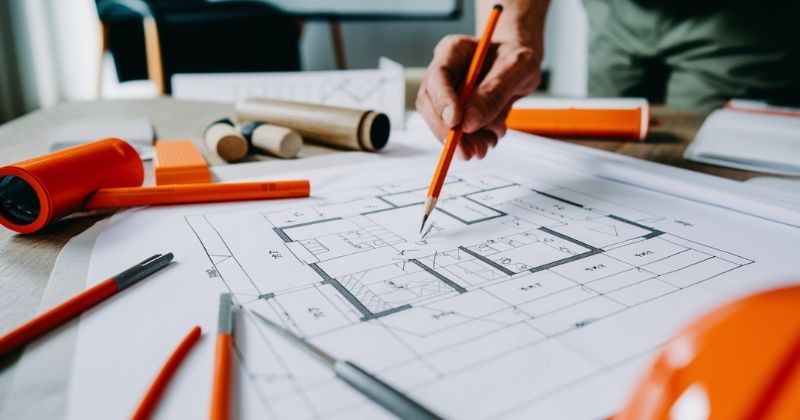
Property Size and Cost Correlations
The size of a property plays a significant role in determining the cost of building a home in South Africa. Understanding how different property sizes influence construction budgets can assist in planning effectively. Below is an overview of the cost estimates for small, medium, and large homes.
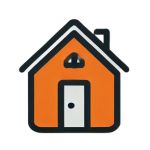
Small Homes (50-100m²)
Small homes are a practical and cost-effective choice for many South Africans. Construction costs typically range from R300 000 to R2 400 000, depending on factors such as location and the quality of finishes chosen.
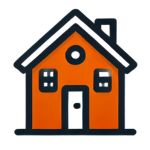
Medium-Sized Homes (100-150m²)
Medium-sized properties strike a balance between space and affordability, making them a popular choice. Building costs for these homes generally fall between R600 000 and R3 600 000. Using a construction cost calculator can provide a more precise estimate tailored to specific requirements.
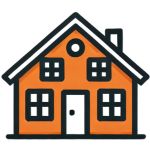
Large Homes (150-200m²+)
Large homes, including luxury residences and spacious family properties, offer ample living space but come with higher costs. Prices begin at R900 000 and can exceed R4 800 000, influenced by design intricacies and the quality of materials used.
Property Size and Cost Breakdown
| Property Size | Minimum Cost | Maximum Cost |
|---|---|---|
| Small (50-100m²) | R300 000 | R2 400 000 |
| Medium (100-150m²) | R600 000 | R3 600 000 |
| Large (150-200m²+) | R900 000 | R4 800 000+ |
How to Get Accurate Building Quotes for the Cost of Building in South Africa
Obtaining reliable building quotes is essential to manage your budget effectively and avoid unexpected financial setbacks. The following advice can help ensure you receive accurate quotes when building in South Africa.
Be Specific About Your Requirements
When seeking a building quote, clearly outline your needs. Include details such as the project’s dimensions, design complexity, construction type, and the materials or finishes you prefer. Providing detailed information enables contractors to offer precise estimates.
Request Quotes From Multiple Contractors
Approach several contractors for quotes to gain a broader understanding of typical building costs in South Africa. Comparing quotes allows you to assess pricing and service offerings. Be wary of significantly lower quotes, as they may indicate hidden costs, poor workmanship or poor quality materials.
Verify References And Review Previous Work
Before finalising your choice of contractor, check their references and examine examples of their previous work. This step provides insight into their expertise and work standards. Additionally, contact past clients to gather feedback on their experiences with the contractor.
Evaluate The Contractor’s Reputation
A contractor’s reputation often impacts overall costs. Established and reputable contractors may charge more, but their expertise and reliable work typically justifies the expense. On the other hand, choosing a contractor with a less reliable reputation may lead to short-term savings but could result in poor quality and costly repairs later.
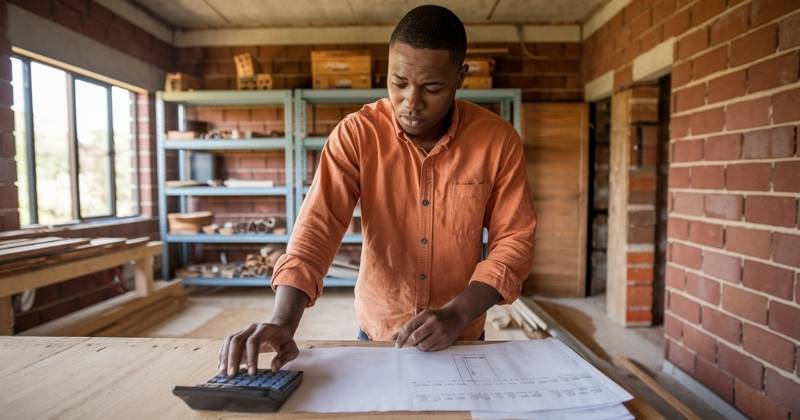
Effective Strategies for Minimising Construction Costs
Construction in South Africa can often be costly, but there are several practical approaches to reduce expenses without sacrificing quality. Below are key strategies to help manage and lower construction costs effectively:
- Create a Detailed Plan and Budget: Thorough planning and budgeting are essential to managing construction expenses. Prepare a comprehensive project plan and establish a realistic budget before commencing any work. This process helps prevent unexpected costs and ensures all expenditures remain within the allocated budget.
- Explore Cost-Effective Building Methods: Alternative construction techniques, such as timber or steel frame methods, often prove more affordable than traditional brick-and-mortar options. These methods typically require less time to complete, which can significantly reduce labour costs while still meeting quality standards. While alternative materials may offer cost savings, their long-term viability and regulatory approval should always be assessed. Working with experienced professionals from the outset can help prevent costly mistakes and ensure compliance with all necessary building standards.
- Prioritise Locally Sourced Materials: Using materials sourced within South Africa can considerably lower construction expenses. Imported materials generally incur higher costs due to shipping and handling. Choosing local materials not only saves money but also contributes to the local economy.
- Negotiate with Contractors: Engage in price negotiations with contractors to secure favourable terms. While cost is an important consideration, prioritise contractors with a solid reputation and proven experience to ensure the quality of work aligns with your expectations.
Choosing where to build in South Africa is just as important as the cost. Some areas demand higher construction expenses due to land prices and infrastructure. If you’re considering Suburbs in Johannesburg, you’ll find a variety of locations that cater to different budgets, from upmarket estates to more affordable residential zones.
Conclusion
Building a house in South Africa involves various factors that influence costs, including location, materials, and design complexity. Careful planning, budgeting, and making informed decisions about construction methods and materials can significantly lower expenses without compromising quality. By sourcing local materials, exploring alternative building techniques, and working with reputable contractors, prospective homeowners can optimise their construction budgets. For the most accurate cost estimates, it is crucial to consult professionals, such as quantity surveyors and contractors, to tailor the budget to specific needs and regional conditions.
Frequently Asked Questions
The cost of building a house in South Africa in 2025 generally ranges between R10 000 and R20 000 per square metre. The exact figure depends on various factors, including the location of the property, the quality of materials used, and the construction standards applied.
To manage and lower construction costs, consider using locally sourced materials, which are often cheaper and support the local economy. Explore cost-effective building methods, such as timber or steel frames, which may also reduce labour costs. Additionally, obtaining multiple quotes from contractors ensures you find the best combination of quality and affordability.
While not mandatory, most people choose a building loan to finance their home construction. This type of loan differs from a traditional home loan as funds are released in phases, corresponding to completed stages of construction. To qualify, you need a strong credit record and proof that your builder is registered with the National Home Builders Registration Council (NHBRC).
Building a home eliminates certain costs associated with purchasing an existing property, such as transfer duty and administrative fees related to transferring ownership. Additionally, new homes often use updated materials and systems, resulting in fewer maintenance issues and potential long-term savings.
To secure a trustworthy contractor, check their references, review examples of their previous work, and seek feedback from past clients about their experiences. While reputable contractors may charge higher fees initially, their expertise and reliability reduce the likelihood of costly errors or repairs in the future.
Fast, uncomplicated, and trustworthy loan comparisons
At Arcadia Finance, you can compare loan offers from multiple lenders with no obligation and free of charge. Get a clear overview of your options and choose the best deal for you.
Fill out our form today to easily compare interest rates from 16 banks and find the right loan for you.


